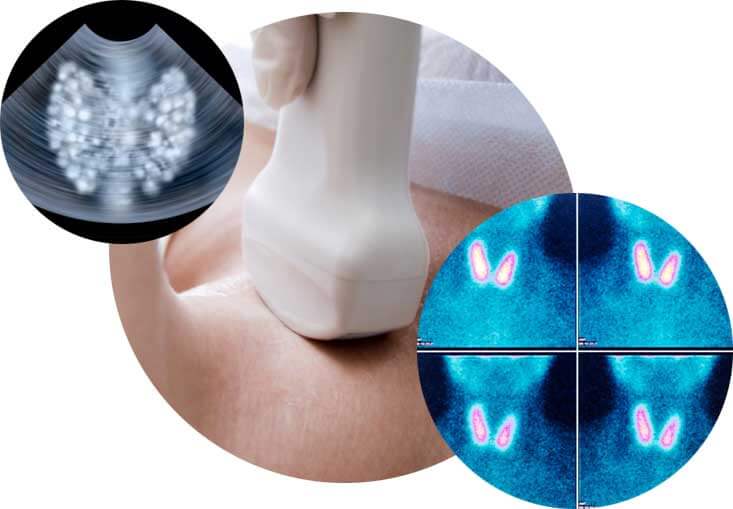Thyroid Cancer
What are the symptoms of thyroid cancer?
Early on, people might not notice any symptoms. They might find out they have thyroid cancer after their doctor does an imaging test of their neck for another reason. Imaging tests create pictures of the inside of the body.
When thyroid cancer causes symptoms, the most common symptom is a growth (called a “nodule”) on the thyroid gland. This growth usually gets bigger in a short amount of time. In some cases, people see or feel the growth themselves. In other cases, their doctor or nurse feels the growth during a routine exam.
Other symptoms of thyroid cancer can include:
- Hoarseness or being unable to talk
- Trouble breathing
- Trouble swallowing
- A cough or coughing up blood
All of these symptoms can also be caused by conditions that are not thyroid cancer. But if you have these symptoms, tell your doctor or nurse.
Is there a test for thyroid cancer?
Yes. If you have a growth on your thyroid gland, your doctor will do tests to see whether the growth is cancer or not. (Many growths on the thyroid gland are not cancer.) These tests can include:
- Imaging tests – The imaging test most often done is an ultrasound, which uses sound waves to create pictures of the thyroid. Some people also have a thyroid scan. For a thyroid scan, a person gets a pill or shot with a small amount of a radioactive substance. Then a special camera takes a picture of the thyroid.
- Blood tests
- Fine needle aspiration – For this test, the doctor uses a thin needle to remove a small sample of tissue from the growth. Then another doctor looks at the tissue under a microscope.
What is cancer staging?
Cancer staging is a way in which doctors find out if a cancer has spread past the layer of tissue where it began, and, if so, how far.
The right treatment for you will depend a lot on the type of thyroid cancer you have, its stage, and your other medical problems
How is thyroid cancer treated?
Thyroid cancer is usually treated with 1 or more of the following:
- Surgery – In most cases, thyroid cancer is treated with surgery to remove the cancer. Your doctor will remove part or all of your thyroid gland. He or she might also remove nearby lymph nodes, which are bean-shaped organs that are part of the body’s infection-fighting system.
- Radioactive iodine – Radioactive iodine (also called “radioiodine therapy”) comes in a pill or liquid that you swallow. It has a small amount of radiation and can destroy much of the thyroid gland.
- Thyroid hormone – Your doctor will prescribe thyroid hormone medicines after surgery or radioactive iodine treatment. That way, your body will have the correct amount of thyroid hormone.
- External-beam radiation therapy – This treatment uses high doses of X-rays, called radiation, to kill cancer cells. The radiation comes from a machine that is outside the body.
- Chemotherapy – Chemotherapy is the term doctors use to describe a group of medicines that kill cancer cells. This is not often indicated.
What happens after treatment?
After treatment, your doctor will check you every so often to see if the cancer comes back. Regular follow-up tests include exams, blood tests, and imaging tests. Your doctor will also do regular follow-up blood tests to check your thyroid hormone levels.
You should also watch for the symptoms listed above. Having those symptoms could mean your thyroid cancer has come back. Tell your doctor or nurse if you have any symptoms
What happens if my thyroid cancer comes back or spreads?
If your thyroid cancer comes back or spreads, you might have more surgery, radioactive iodine treatment, external-beam radiation, or chemotherapy.
What else should I do?
It’s important to follow all your doctor’s instructions about visits and tests. It’s also important to talk to your doctor about any side effects or problems you have during treatment.
Getting treated for thyroid cancer involves making many choices, such as what treatment to have. Always let your doctors and nurses know how you feel about a treatment. Any time you are offered a treatment, ask:
- What are the benefits of this treatment?
- Is it likely to help me live longer? Will it reduce or prevent symptoms?
- What are the downsides to this treatment?
- Are there other options besides this treatment?
- What happens if I do not have this treatment?

